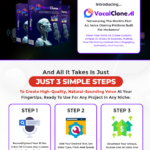Think of it as being a tour guide in the vast EdTech landscape. You point eager learners towards the most valuable resources, and educational platforms reward you for your expertise. But where do you start? Don’t worry, we’ve got you covered. This guide will equip you with the best practices to navigate the world of affiliate marketing for educational products. From choosing the right programs to crafting compelling content, we’ll show you how to turn your knowledge into a profitable online venture. So, grab your metaphorical backpack and get ready to explore!
My Proven Way to Make $100-$200 Per Day With 0 Investment – Watch THIS FREE Video to START >>

Picking Your Perfect Educational Niche: Don’t Be a Jack-of-All-Trades
The EdTech world is vast, so trying to promote everything from coding bootcamps to astrophysics documentaries might leave you feeling lost (and frankly, so would your audience). Here’s why niching down is crucial:
- Laser Focus, Bigger Impact: By specializing in a specific area like language learning or professional development, you become a trusted authority for your audience. They’ll see you as the “go-to guide” when it comes to navigating educational products in that niche.
- Speak Their Language: When you focus on a niche, you can tailor your content and promotions to resonate directly with your audience’s needs and challenges.
Now, how do you pick your niche?
- Inner Compass: What educational areas are you passionate about? Where does your own expertise lie? Leveraging your existing knowledge and interest will make creating compelling content much easier (and more enjoyable!).
- Audience Whisperer: Take a peek at your existing audience (website visitors, social media followers) or consider who you’d like to attract. What are their educational goals and challenges?
Educational Affiliate Programs: Not All Diamonds Shine
Once you’ve chosen your niche, it’s time to find the perfect affiliate programs. But hold on there, affiliate marauder! Not all programs are created equal. Here’s what to keep in your treasure chest (figuratively speaking) when evaluating them:
- Quality Check: Is the educational product high-quality and effective? Would you recommend it to your own family (or at least your most curious goldfish)?
- Commission Quest: This is where the money honey flows! Research the commission structure offered by different programs. Ideally, you want a program with a competitive commission rate that aligns with your efforts.
- Reputation Matters: Check out the program’s reputation online. Are there positive reviews from students and affiliates? A program with a solid track record inspires trust.
- Affiliate Ally: Does the program offer helpful resources and support for affiliates? Look for programs that provide marketing materials, tutorials, and dedicated support to help you succeed.
Content that Converts: Your Keys to Affiliate Marketing Success
So you’ve chosen your niche and unearthed some stellar educational affiliate programs. Now comes the real fun: creating content that compels your audience to learn more (and maybe even click on your affiliate link!).
Content is King (or Queen, No Judgment Here):
- Knowledge is Power: This might sound obvious, but the key to effective content marketing is providing genuine value to your audience. Offer insightful blog posts, articles, or reviews that address their specific educational needs within your chosen niche.
- Choose Your Weapon: The format of your content is your battle cry! Consider blog posts for in-depth analysis, video tutorials for a more hands-on approach, or even product reviews to showcase the educational product’s features and benefits.
- Speak the Search Engine’s Language: Search Engine Optimization (SEO) is your secret weapon for attracting new learners. Research relevant keywords your target audience might use and sprinkle them throughout your content naturally. This helps search engines understand what your content is about and show it to the right people.
Building Trust: The Secret Sauce of Affiliate Marketing
Let’s face it, your audience isn’t naive. They can smell a sales pitch from a mile away. So, how do you build trust and establish yourself as a credible source?
- Been There, Done That: Share your own experience (positive or negative) with the educational product. People connect with authenticity, and showcasing your genuine interest in the product builds trust.
- Unbiased Reviews: While highlighting the product’s strengths, don’t shy away from mentioning potential drawbacks. A balanced review positions you as a trustworthy guide, not just a pushy salesperson.
- Social Proof Power: Testimonials and case studies from satisfied students using the educational product are like gold nuggets. They add social proof and show your audience the product’s real-world impact.
My Proven Way to Make $100-$200 Per Day With 0 Investment – Watch THIS FREE Video to START >>
Effective Promotion Strategies for Educational Affiliate Marketing
The education sector has seen a surge in online offerings, creating a prime opportunity for affiliate marketing. By promoting valuable educational products and services, you can earn commissions while helping learners achieve their goals. But reaching the right audience requires a strategic approach. Here’s a breakdown of effective promotion strategies across various marketing channels:
1. Exploring Marketing Channels:
- Social Media Marketing: Identify the platforms where your target audience spends their time. Platforms like LinkedIn, Twitter, and even Pinterest can be goldmines for educational content.
- Tactics:
- Create bite-sized, engaging content: Think quizzes, polls, or intriguing questions related to the course or tool you’re promoting.
- Utilize visuals: Infographics, short explainer videos, or image quotes can grab attention and make your content more shareable.
- Collaborate with educators or influencers: Partnering with established figures in the field can expand your reach and leverage their audience trust.
- Email Marketing: EdTech content marketing thrives on email nurturing. Build an email list of potential learners interested in educational resources.
- Tactics:
- Segment your audience: Tailor your email campaigns to specific needs and interests.
- Offer valuable content: Provide free resources, cheat sheets, or study tips before promoting paid courses.
- Highlight success stories: Showcase testimonials from satisfied learners who benefited from the educational product.
- Paid Advertising: Utilize platforms like Google Ads or social media advertising to target users searching for relevant educational keywords.
- Tactics:
- Optimize ad copy: Research relevant keywords and craft compelling ad copy that emphasizes the benefits of the educational product.
- Target specific demographics and interests: Ensure your ads reach the exact audience most likely to be interested in the course or resource.
- Track and analyze results: Monitor the performance of your paid ads and adjust your targeting or messaging for better conversion rates.
2. Building Audience and Establishing Trust:
The cornerstone of successful educational affiliate marketing is establishing yourself as a trusted source of information.
- Focus on providing genuine value: Offer insightful content, real-life examples, and honest reviews of educational products.
- Be transparent: Disclose your affiliate partnerships clearly.
- Engage with your audience: Respond to comments, answer questions, and participate in discussions relevant to your niche.
- Maintain consistency: Regularly create informative content to keep your audience engaged and coming back for more.
By implementing these strategies and building trust with your audience, you can effectively promote educational affiliate programs and generate a steady stream of commissions.
My Proven Way to Make $100-$200 Per Day With 0 Investment – Watch THIS FREE Video to START >>
Tracking, Analyzing, and Optimizing for Success
In the fast-paced world of affiliate marketing, data is king. Without tracking and analyzing your efforts, you’re flying blind and missing opportunities to maximize your commissions.
1. Importance of Tracking Affiliate Marketing Efforts:
Tracking allows you to measure the effectiveness of your promotional strategies and identify areas for improvement. This data-driven approach helps you:
- Identify what’s working: See which marketing channels, content formats, or messaging resonate best with your target audience.
- Allocate resources efficiently: Focus your efforts on strategies proven to generate clicks, conversions, and ultimately, sales.
- Optimize campaigns in real-time: Make adjustments to your content, ad copy, or targeting based on performance data.
2. Key Metrics to Monitor:
Several key metrics provide valuable insights into your affiliate marketing performance. Here are some essential ones to track:
- Clicks: This metric measures the number of times users click on your affiliate links. While a high click-through rate (CTR) is desirable, it doesn’t guarantee sales.
- Conversions: This metric shows how many clicks translate into actual sales or sign-ups for the educational product you’re promoting. Conversion rate is a far more valuable indicator of success.
- Sales: Ultimately, your goal is to drive sales for the educational product. Track the total number of sales generated through your affiliate links.
- Customer Acquisition Cost (CAC): This metric helps you determine the cost of acquiring a new customer through your affiliate marketing efforts.
3. A/B Testing and Continuous Optimization:
The best practices in affiliate marketing are constantly evolving. A/B testing allows you to compare different versions of your content, ad copy, or landing pages to see which performs better.
- Test different headlines, visuals, and call-to-actions (CTAs): See what resonates best with your audience and drives higher click-through rates.
- Compare landing page layouts and offers: Optimize your landing pages for conversions and maximize sales generated through your affiliate links.
- Test ad copy variations across different platforms: See which messaging performs best on social media compared to paid advertising platforms.
By continuously testing and analyzing your data, you can continuously optimize your affiliate marketing efforts. Remember, even small improvements in conversion rates can significantly impact your bottom line.
My Proven Way to Make $100-$200 Per Day With 0 Investment – Watch THIS FREE Video to START >>
Conclusion
Educational affiliate marketing offers a rewarding opportunity to earn commissions while helping others achieve their learning goals. By implementing the strategies outlined above, you can effectively reach your target audience, build trust, and promote valuable educational products. Remember, success hinges on consistently tracking your results, analyzing data, and continuously optimizing your approach. By embracing a data-driven mindset and a commitment to providing genuine value, you can position yourself as a trusted resource and thrive in the ever-evolving world of educational affiliate marketing.









